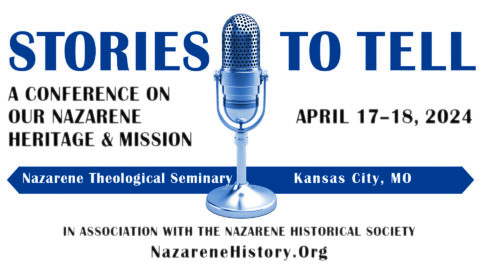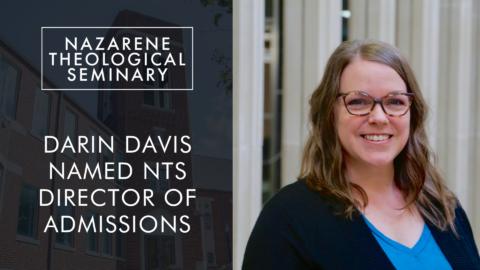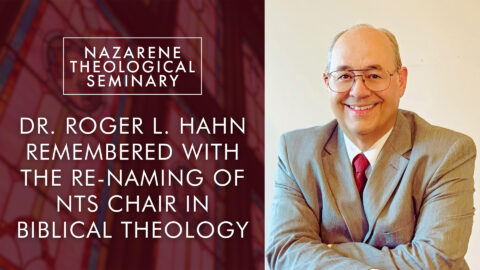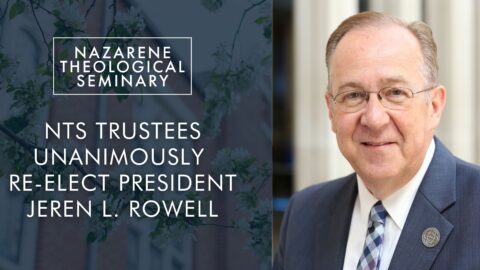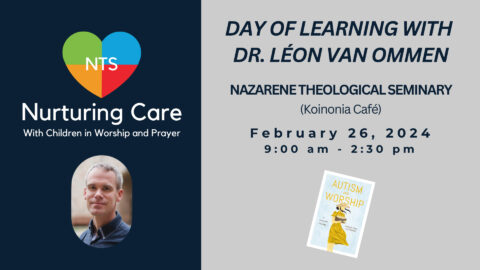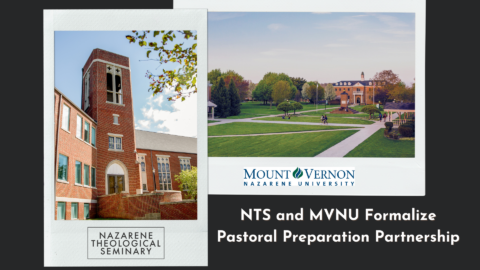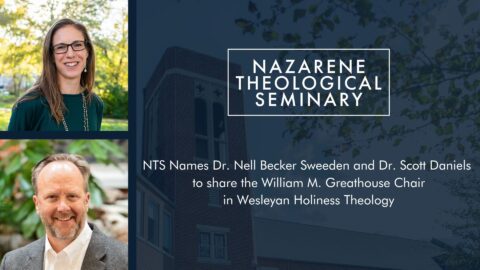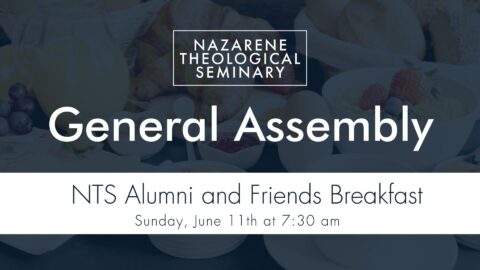Dr. Alex R. G. Deasley, Emeritus Professor of New Testament at NTS, received the Lifetime Achievement Award from the Wesleyan Theological Society, which was held at NTS on March 6-7. Dr. Thomas Noble, Professor of Theology at NTS, made the presentation and offered the following tribute:
The Wesleyan Theological Society
Lifetime Achievement Award 2020
Tribute to Dr Alex Deasley
T.A. Noble
March 7, 2020
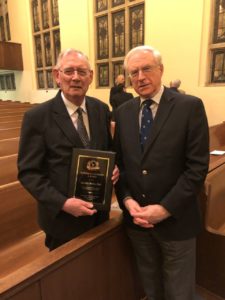 It is my privilege this evening, and my joy, to pay tribute to the member of our society who has been chosen this year to receive the Lifetime Achievement Award. All of us are familiar with the name of Dr Alex Deasley.
It is my privilege this evening, and my joy, to pay tribute to the member of our society who has been chosen this year to receive the Lifetime Achievement Award. All of us are familiar with the name of Dr Alex Deasley.
It is not that Deasley is a common name. It is indeed – appropriately – very rare! He explained to me some years ago, that the name is actually French, and that it was originally de Asley. Now you will all realize, I’m sure, that the little preposition ‘de’ – like the German ‘von’ – indicates that it is – again appropriately – an aristocratic name. Indeed, my speculation is that – like the name Noblē and indeed the name Bassét – the name de Asley indicates that the family came across from Normandy to England in 1066 with William the Conqueror. Like the Nobles, the de Asleys had the good sense to travel north and settle in Scotland. And it was in the fine old Scottish city of Dundee that our honoree was born.
Robert Deasley, his father, was the leader of a mission in Dundee which united with the Church of the Nazarene. Then, as a Nazarene pastor, he then accepted a call to Birmingham, so that it was in that large industrial city in England that his son gained entrance to King Edward’s School, an independent boys’ grammar school founded by King Edward VI in 1552. But this grammar schoolboy engaged in some rather unusual extra-curricular activities
The Rev. Robert Deasley believed in evangelism and he would regularly take a group of his young men, Les and Don Evans, Brian Farmer and his own son Alex, out to preach in the open air in Birmingham. His method was simple. The young men didn’t know who was going to be chosen until the moment came when they had stand up and preach. After this rigorous training three of the group went on to give life-time service as Nazarene preachers. Dr Deasley has always regarded himself as a preacher on loan to education.
When he left King Edward’s School in 1953, our honoree had gained the qualifications to enter the University of Cambridge, founded in 1209. But before he took up his place at one of England’s two most prestigious ancient universities, Alex Deasley enrolled in Hurlet Nazarene College, founded in 1944. Unlike the University of Cambridge with its immense investments, Hurlet Nazarene College back in Scotland near Glasgow, was run on a shoestring. J. Kenneth Grider had taught there some years earlier while completing his PhD studies at the University of Glasgow. It began as all our colleges did with no accreditation, granting only the college’s diploma. The living conditions could be described as ‘spartan’ and students had to engage in daily unpaid manual labour around the college and its 20 acres in order to keep the fees to a minimum.
But in 1955, the young student took his place in the very different surroundings of Jesus College, Cambridge, studying New Testament. Leading scholars such as C.F.D. Moule and H.H. Farmer were significant influences and he also benefitted from the teaching of the brothers, Henry and Owen Chadwick. The Scottish Methodist, Howard Marshall, was a contemporary. Our honoree graduated in 1958, the first Nazarene to take a British theological degree since Olive Winchester over forty years earlier. He then returned to the Nazarene college as a lecturer at the invitation of the principal, Dr Hugh Rae. By this time however, it was British Isles Nazarene College – BINC – now in Didsbury, Manchester.
I have heard so many of the students of those days (some of whom have gone to be with the Lord) testifying to the inspiring teaching which they received from Alex Deasley. The Revd Tom Findlay came on to seminary here in Kansas City and returned to Europe to teach at European Nazarene Bible College (as it was). A number of others gave a lifetime of service in pastoral ministry. The Revd Colin Wood, now retired from forty years in the Nazarene ministry, the last twenty as a district superintendent, recalls that Dr Deasley not only taught New Testament, but also Old Testament, Systematic Theology and Homiletics, and it seemed (he writes) that each of these was his ‘specialist subject’! Colin Wood writes that he still has his lectures notes on the Atonement, ‘still of value and relevance today’.
The Revd. Robert Deasley had accepted a call to Canada in 1954, and it was on a visit there, that Alex Deasley met Joyce Metz, a nurse from Red Deer who had attended Canadian Nazarene College. They married in 1958, the year in which he graduated, so that it was as a married man, that Alex Deasley took up his first teaching post at BINC. The nurse not only looked after his health and organized his home (also typing his articles and books), but (from my memory) also took very great care to supervise his driving! As well as teaching, he was also pastor of the Ashton Church of the Nazarene from 1962 to 1965. Richard, Shauna, and Jeremy were all born during these years in the Manchester area
While in Manchester, Alex Deasley undertook PhD research under the doyen of evangelical biblical scholars, Prof. F.F. Bruce. Students from all over North America came to do research under Bruce. His thesis on ‘The Idea of Perfection in the Qumran Texts’ was completed in 1972.
After some years of service in Canadian Nazarene College in Winnipeg, Dr Deasley was called in 1977 (after Ralph Earle’s final retirement) to be Professor of New Testament here at Nazarene Theological Seminary. Dr Andy Johnson, who later succeeded him, was one of his students and became his teaching assistant. He remembers being first impressed by the new professor’s scholarship when a student asked a question about what a prominent scholar would say about such-and-such an issue. Without hesitation, the new professor answered in detail giving the book title and page number where the information could be found. Andy Johnson also recalls with pleasure that owing to the pace of his delivery, it was possible to write down every word he said. The notes from his lectures on Romans had levels and sublevels deeper than one would think possible. He comments: ‘[Dr Deasley] was determined to exemplify a careful, thorough treatment of the biblical text in such a way that his students might learn to practise a responsible interpretation of Scripture in service to the Church.’
Dr Harold Raser expresses appreciation for Dr Deasley’s collegial support and writes about his preaching in chapel:
I was privileged, and blessed, to sit under Alex’s preaching ministry in the Nazarene Theological Seminary chapel for twenty-two years. I only wish he could have preached more… Some of us drew rather meagre attendance when it was our turn to preach. Alex, however, always “packed them in.” And for good reason! Everyone knew that they would hear a masterfully-crafted message, carefully done in every detail — interesting, engaging, deeply thoughtful, spiritual nourishment for the heart and head (and — who didn’t love listening to all this delivered in a pleasing, dignified British accent?! :)).
Dr Roger Hahn recalls Dr Deasley coming to preach at the then Bethany Nazarene College as Staley Lecturer. He writes:
The previous year the Lecturer had failed to gain attention and respect from the student body (they were boisterous and rude). I told Alex preaching in chapel might be akin to street preaching. I was amazed to see the sedate and academic Dr. Deasley preaching with grand gestures, stories of snowball fights, high energy in his speech and completely captivating the chapel audience.
Roger Hahn also recalls Dr Deasley in faculty meetings at NTS:
As a faculty member (before I became the Dean of the Faculty), I noticed that when the faculty became divided on an issue, Alex was the one who suggested a middle way that would end up being satisfactory for both sides. I was sorry that he retired as I became the Dean. I would have prized that ability that he had to find helpful, mediating positions.
As a student, Andy Johnson also learned to appreciate his professor’s dry sense of humour and his one-liners. He recalls the story of his leaving a chapel service one day when the preaching had been (shall we say?) rather disappointing. Turning to his close colleague, Dr Paul Bassett, he was heard to remark, ‘Of all the sermons I have ever heard – that one was the most recent!’
One thing he was not noted for was his interest in sport. The story is told of a round table discussion at a faculty retreat when each one in the group was asked to tell of the first time in their lives that they remember enjoying sport. Dr Deasley was the last responder. Looking off into the middle distance, he said: ‘The first time I ever remember [pause] enjoying a sport [long pause] is yet to come.’
In addition to the immense contribution Dr Deasley has made to the Church through his decades of preaching and teaching and the thorough preparation of preachers and pastors, we also must take note of his work in publishing. He was a contributor to the original Beacon Bible Commentary, jointly authoring the volume on Deuteronomy with his Manchester colleague, Dr Jack Ford. One of his earlier shorter books, Doctrines are Different, was on the Arminian-Calvinist debate. That was the book used at NYPS Institute one year when I was seventeen enjoying the first lectures I ever heard in Theology.
His work in publishing also included five years as editor of the Wesleyan Theological Journal from 1982 to 1987. During those years he saw into print contributions from an earlier generation of Wesleyan scholars and theologians – Albert Outler, Frank Baker, Melvin Dieter, Timothy L. Smith, Carl Bangs and Richard S. Taylor, to name only a few.
Dr Kent Brower points to his contribution to the understanding of Christian holiness, particularly in the important article in the Wesleyan Theological Journal in 1979, ‘Entire Sanctification and the Baptism with the Holy Spirit.’ This (Kent Brower comments) brought needed biblical clarity to the theological conversation on this then controversial topic. His work, Marriage and Divorce in the Bible and the Church, published in 2000, came at a time when we were struggling to respond to the increasing incidence of divorce and enabled us to navigate a course loyal to Scripture but guided by grace. He used to remark jocularly that he had to become used to people referring to ‘Deasley’s marriage and divorce.’ But indeed, our honoree not only wrote the book on the subject giving guidance to the Church, but toward the end of sixty years of marriage, he exemplified in his care for his wife in her last years what Christian marriage looks like.
His book, The Shape of Qumran Theology, developed from his Didsbury Lectures, was also published in 2000. Here, drawing on the expertise of his earlier doctoral research he contributed a significant overview of the theology of the Qumran sect. Kent Brower also comments that, given that one of his first publications was his contribution to the Beacon Bible Commentary, it is fitting that one of the last volumes to be published in the New Beacon Bible Commentary fifty years later will be his commentary on I Corinthians – now nearing completion. He also has been the occasion for a notable publication when former students and colleagues published a Festschrift in 2007: Holiness and Ecclesiology in the New Testament.
Dr Deasley, I know well that we Britons and especially we Scots, hate to have tributes paid to us. Receiving compliments is excruciating agony! I think it comes from the way in which Scottish parents were always so careful that their offspring didn’t get too big-headed! But please know that all of this is well-meant. We truly love and respect you and just want to say, ‘Thank you,’ for the model you have given us of Christian scholarship and as a Christian preacher and a Christian believer, consecrated to the way of holiness and to the service of the King.
We your colleagues salute you.
We look forward to further publications in the years ahead, and pray that as you continue to serve him the Lord will richly bless you!
—
An official press release from the Wesleyan Theological Society is available here.

